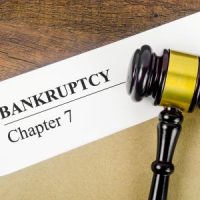Means Testing for Chapter 7 Bankruptcy

Do you qualify to file for Chapter 7 bankruptcy? Many people don’t realize that the filing process includes means testing in order to have debt discharged with no repayment plan. While it’s a federal process, state law in Florida governs the rules around exemptions—meaning you can’t claim exemptions provided under federal law. The means test is designed to compare your income with that of the median income in Florida for households the same size as yours. Qualification for Chapter 7 is automatic if your income over the past six months is below the median, but if not, it could be a little trickier.
Exemptions to Means Testing
There are some circumstances under which means testing is not required:
When your debt is from something other than consumer debt—such as from medical issues;
If you are a disabled veteran who accumulated the majority of the debt while serving in active duty or when performing other homeland defense duties.
What Counts as Income?
Any and all sources of household income must be included in your income calculations, including but not limited to unemployment payments, rental income, dividends, and interest income over the previous six months.
If Your Income is Above the Median
If your income exceeds the median income in the Sunshine state, (which is adjusted every six months) you’ll have to go through some detailed calculations in order to figure out your amount of disposable income—the amount of money you have left over after paying your bills—over the past five years. The calculations are as follows:
- You subtract any allowable expenses (housing, utilities, food, clothing, childcare, child support payments, medical costs, and so forth) from your gross monthly income;
- Take that amount and multiply if by 60—the number of months in five years;
- If that total is below $7,025, you’ll likely qualify for Chapter 7;
- It that total exceeds $11,725, you’ll probably (but not definitively) not qualify;
- If that total is between the amounts noted, you’ll have to do some additional calculations.
Exemptions
There are many exemptions allowed when filing for bankruptcy. Some of the most common include:
- An unlimited Homestead Exemption on property limited to ½ acre in a municipality;
- A vehicle valued at $5,000 or less;
- Personal property up to $1,000, or $4,000 if you’re not using the homestead exemption;
- Devices aiding in health or mobility;
- Savings accounts dedicated to education, medical, health, or hurricane preparedness;
- Retirement accounts of public employees, including firefighters, teachers, and police;
- Veteran’s benefits;
- Workers’ compensation benefits;
- Social security income;
- Public assistance;
- Alimony and child support;
- Death benefits received as a beneficiary.
Helping You Through
The experienced Miami bankruptcy attorneys at the Law Office of Julia Kefalinos understand how overwhelming the process of filing for bankruptcy can be. We are here to help. Schedule a confidential consultation in our Miami office today.

